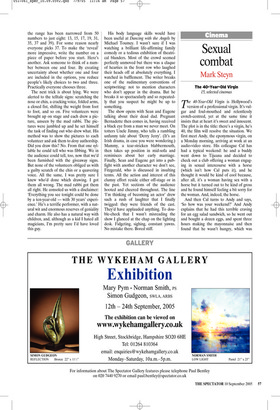All in the mind
Lloyd Evans
Marc Salem's Mind Games Tricycle Dancing with the Angels Union Interesting news from the world of conjuring. Magicians don’t believe in magic any more. Marc Salem, one of the new breed of sceptical illusionists, isn’t a clairvoyant or a mind-reader but a ‘professor of non-verbal communications’. And he boosts his university income by sitting in on CIA interviews to help the spooks decide when a suspect is lying. I certainly wouldn’t like to face him across the interrogation room. He’s as wide as he is tall, and he wears a black frock-coat which makes him look like a cross between a mad rabbi and a Victorian undertaker. His beard is unnervingly neat, he has shrewd little I-can-see-through-you eyes, and his huge white skull has apparently been blasted clean of hair by the electromagnetic storms of his inextinguishable brain.
His show is well worth catching, a mixture of maths, theatre, psychology and stand-up. He starts with a simple trick which he invites us to try at home. Think of a number between 0 and 50. It has to be a two-digit figure, the numbers can’t include an even number, nor can they be the same. (By making these qualifications the range has been narrowed from 50 numbers to just eight: 13, 15, 17, 19, 31, 35, 37 and 39). For some reason nearly everyone picks 37. To make the ‘reveal’ more impressive, write the number on a piece of paper before you start. Here’s another. Ask someone to think of a number between one and four. By creating uncertainty about whether one and four are included in the options, you reduce people’s likely choices to two and three. Practically everyone chooses three.
The next trick is about lying. We were alerted to the telltale signs: scratching the nose or chin, a cracking voice, folded arms, a closed fist, shifting the weight from foot to foot, and so on. Five volunteers were brought up on stage and each drew a picture, unseen by the mad rabbi. The pictures were jumbled up and he set himself the task of finding out who drew what. His method was to show the pictures to each volunteer and ask them to deny authorship. Did you draw this? No. From that one syllable he could tell who was fibbing. We in the audience could tell, too, now that we’d been furnished with the giveaway signs. But none of the volunteers obliged us with a guilty scratch of the chin or a quavering voice. All the same, I was pretty sure I knew who’d done which drawing. I got them all wrong. The mad rabbi got them all right. He consoled us with a disclaimer: ‘Everything you see tonight could be done by a ten-year-old — with 30 years’ experience.’ He’s a terrific performer, with a natural wit and enormous reserves of geniality and charm. He also has a natural way with children, and, although as a kid I hated all magicians, I’m pretty sure I’d have loved this guy. His body language skills would have been useful at Dancing with the Angels by Michael Toumey. I wasn’t sure if I was watching a brilliant life-affirming family comedy or a tedious exhibition of theatrical blunders. Most of the crowd seemed perfectly unmoved but there was a claque of hearties in the front row who laughed their heads off at absolutely everything. I watched in bafflement. The writer breaks one of the rudimentary conventions of scriptwriting: not to mention characters who don’t appear in the drama. But he breaks it so spectacularly and so repeatedly that you suspect he might be up to something.
The show opens with Sean and Eugene talking about their dead dad. Pregnant Bernadette then comes in, having received a black eye from a man we never meet. On totters Uncle Jimmy, who tells a rambling unfunny tale about ‘Derry Jerry’. (It’s an Irish drama, in case you were wondering.) Mammy, a tear-stricken blabbermouth, then takes up position in mid-sofa and reminisces about her early marriage. Finally, Sean and Eugene get into a pubfight with another character we don’t see, Fitzgerald, who is discussed in insulting terms. All the action and interest of this clumsy effort reside either off-stage or in the past. Yet sections of the audience hooted and cheered throughout. The line ‘I’m thinking of becoming an actor’ drew such a rush of laughter that I finally twigged: they were friends of the cast. They’d have applauded anything. To double-check that I wasn’t misreading the show I glanced at the chap on the lighting desk. Fidgeting, sighing, constant yawns. No mistake there. Bored stiff.

























































 Previous page
Previous page